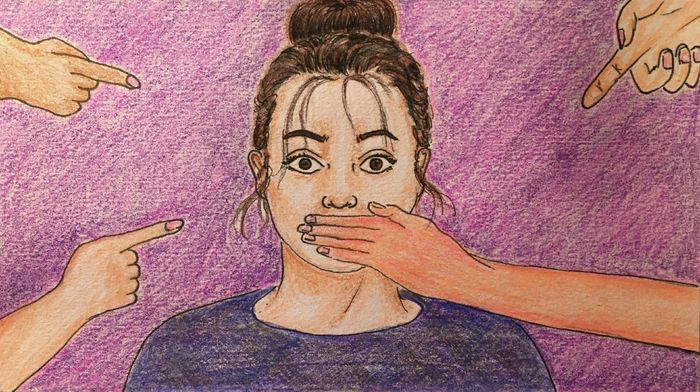Content note: this article contains discussions of sexual harassment and assault
One website that has been on the lips of many school students this year has been Everyone’s Invited, which anonymously posts the testimonies of victims of sexual assault as well as more general instances of rape culture mostly at secondary schools. Amongst the over 16,500 testimonies, almost 3,000 British schools have been mentioned as places where rape culture flourishes, meaning environments where victims have felt ignored or environments which excuse or even promote misogyny and sexual assault. This is a particularly personal topic as I submitted accounts of my own experiences with the rape culture rampant in my former school when my friend submitted an open letter to the headmaster only two days after receiving 250 testimonies.
These websites and open letters served as indicators of a nationwide phenomenon, prompting Ofsted to launch an investigation and release a report demonstrating the normalisation of these actions and attitudes in schools, saying that harmful sexual behaviours were so common as to be seen as normal. 90% of schoolgirls were found to have received unsolicited explicit pictures and 80% said that sexual assault happens either sometimes or a lot between people their age at secondary school. Indeed, the inspectors saw this to be so prevalent within schools that they told school leaders to “act on the assumption” that sexual harassment was affecting their students. It is important to clarify that even seemingly lower-level actions and attitudes often dismissed as ‘banter’ facilitate and enable instances of sexual assault. It was only when I came to university that I realised how normalised many problematic aspects of my school experience were.
“This rape culture is so pernicious because it desensitises sexual harassment and assault not only to the perpetrators, but to bystanders, and, most importantly, to the victims that dismiss their harrowing experiences”
This rape culture is so pernicious because it desensitises sexual harassment and assault not only to the perpetrators, but to bystanders, and, most importantly, to the victims that dismiss their harrowing experiences or internalise the prevailing message that ‘it’s not a big deal’ and that nothing will be done. I can only write from my own experiences and those I witnessed in my friends, so this certainly won’t be representative of everyone – but in my school, rape culture was pervasive and unavoidable, manifesting in chatter overheard in the corridors, or in something more personal. These instances of harassment are incorrectly dismissed as being perpetrated by a tiny minority of people, and the societal damage is created by the majority of people who stand by and enable these actions to begin with.
Testimonies in the letter submitted to my school run the gamut of rating girls’ attractiveness on the school bus to getting people drunk so they are more vulnerable and using nudes to pressure people into sex, but the most common issue was that people would often know and laugh along, or friends of perpetrators who would pressure victims to withdraw their own testimonies. Schools need to take responsibility and drastic measures against this culture of tacit support – or at best, avoidance of – sexual harassment as established and fomented within schools, in order to protect their students and the wider community. So, what measures are they taking?
Well, they’re not taking any. Instead, they’ve argued that it would be ridiculous to hold them to account for incidences that happen outside of school hours. Indeed, when my former headmaster sent a response to the open letter to parents and alumni, the most responsibility he claimed was that “you [parents] and we are semi responsible” for harassment on school buses. Of course, many schools have a vested interest in maintaining their public image –especially private schools which essentially run as a business – but they cannot claim to be changing until they take responsibility for the environment they create, or at least, sustain. It doesn’t matter if an incident takes place on a Sunday, as these are the actions of students at school, supported by their friends from school, encouraged by the “banter” heard at school and overlooked when mentioned in front of teachers at school.
Arguably, school dynamics have a greater impact than parents on shaping a child’s attitudes to interpersonal relationships. The school is where children spend the majority of their day, make the majority of their friendships and learn from a young age how to interact with others and what is socially acceptable. Indeed, many (especially private) schools set themselves the burden of moulding the behaviours of their students, boasting that they are not simply centres for academic learning, but places that support their students’ growth as individuals into adulthood. Not only does the shirking of responsibility ignore the actions taking place on school grounds, it also fails to address that the culture that encourages and facilitates sexual harassment and assault outside of school takes place on school grounds. Moreover, we see that schools often do take actions even when things happen outside of the classroom. My school had a zero-tolerance drug policy and would punish its students accordingly regardless of whether this happened in a party over the weekend or with people from other schools.
“It is hard to see these institutions attempt to diminish their own responsibility as anything other than an attempt to save face”
I don’t see how this doesn’t apply to sexual assault. It is hard to see these institutions attempt to diminish their own responsibility as anything other than an attempt to save face. Prior to sending out a general statement on the horrible accounts of abuse detailed by students, my school showed a video to students emphasising that such a volume of testimonies could be generated by a few people “getting things wrong” and that knew most people were good, but a small minority could tarnish their reputation. Students from other schools posted on Everyone’s Invited that teachers are telling them not to say anything on these websites. It’s all well and good for institutions to grandstand about making change, but they need to put personal pride aside if they want to make any tangible difference.
Other solutions put forward by schools at best betray a lack of understanding in how rape culture manifests itself within their own institutions, or, in the worst cases, are small gestures to get the media off their backs. Schools have largely focussed on the impacts of cyberbullying and pornography and, whilst these are important, this seems like an attempt to simplify the problem and thereby avoid dealing with messier, more uncomfortable and systemic issues. Children don’t need talks telling them that ‘the internet can be dangerous’ – they know. Inviting speakers into schools allow school boards to think they’ve done something, but I’ve never seen these events go without mockery. It gets worse when it comes to talks about sexual assault; the jokes after a woman came into my school to talk about the pervasiveness of sexual assault and general gender discrimination only made victims feel worse as they saw their pain being blatantly disregarded. Suggestions that former pupils who “had gone wrong” come back and talk to students seem incredibly bizarre, and encouraging male students to come up with policies demonstrates how some schools find it difficult to conceptualise that their own students are the ones who allegedly perpetuate these issues.
It may seem that I am simply attacking schools’ approaches without proposing anything myself. I’m not paid to come up with policies to improve a school and protect its students, but it is apparent that the lack of communication on reports of sexual harassment in schools can be easily remedied. Many testimonies I have read speak of victims feeling ignored, and that they would bring things to schools – only to hear nothing back. Indeed, my former headmaster admitted that “there might be reason at the time as to why things were just allowed to calm down” but also said that sometimes actions were taken – but this was not referred back to the person who reported the incident. I don’t know how such a serious situation can just be allowed to “calm down” and this lack of communication is particularly damaging, as it creates a sense of shame and helplessness that makes them feel that it is pointless to come forward about future issues.
“Sexual harassment and abuse are inextricably linked to cultures of shame and victim blaming, and it is the job of schools to create an encouraging space where people can report abuse and feel that they will be listened to”
Sexual harassment and abuse are inextricably linked to cultures of shame and victim blaming, and it is the job of schools to create an encouraging space where people can report abuse and feel that they will be listened to. Moreover, both schools and the media have ignored testimonies about how rape culture intersects with racism and homophobia. This leaves victims doubly vulnerable by not acknowledging the impacts of having one’s race tied to their sexual value or of someone whose first interactions with their own queerness were traumatic accounts of sexual violence. The feeling of being ignored or unable to have anyone to go to only exacerbates the harm inflicted on victims, and this is something completely preventable by schools through opening a clear dialogue with students.
The saddest part about reading the testimonies submitted about my former school was the fact that they confirmed what I and many others already knew: that sexual harassment and assault was normalised and endemic, affecting those from Year 7 to grown adults who are still scarred by their experiences. Beyond these individual letters, organisations like Everyone’s Invited and investigations from Ofsted have revealed the impact that this perpetuation of rape culture has had on schoolchildren throughout the country. Schools have a duty of care to their students and a responsibility to make sure that they don’t create environments that put them or others in the community in danger. Now is their chance to live up to this commitment. Millions of young children's lives are at stake.


